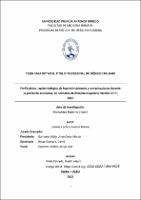Perfil clínico - epidemiológico de hiperbilirrubinemia y complicaciones durante la gestación asociadas, en neonatos del Hospital Cayetano Heredia 2017-2020
Resumen
OBJETIVO:
Determinar el perfil clínico - epidemiológico de hiperbilirrubinemia y
complicaciones durante la gestación asociadas, en neonatos del hospital
Cayetano Heredia del 2017 a 2020.
MATERIAL Y MÉTODO: Estudio de tipo observacional, analítico - transversal,
retrospectivo y con recolección de datos secundarios por ficha de recolección
de datos mediante uso de registro de historias clínicas; el cual tomará una
corte censal para la mayor fidelidad correspondiente.
RESULTADOS:
Se identificaron un total de 116 registros, de los cuales, el 51.72% fueron
varones. En 69.83% se encontró presencia de empleo de lactancia materna de
tipo exclusiva. Sobre la edad de la madre el 95.69% estuvieron entre los 25 a 30
años. Sobre el tipo de parto presentado el 62.07% fue vía vaginal y el 49.14% de
las mamás de los productos presentaron paridad previa. En 75.86% no
presentaron adecuado peso al nacimiento. El 50% de los registros presentó un
registro para APGAR mayor de 7 puntos; el 94.83% de los registros presentó
compatibilidad sanguínea, así como factor RH entre madre e hijo. En 58.62%
pacientes con 34 semanas gestacionales cumplidas; un 40.52% de los registros
presentó entre 7 a 14 días de hospitalización; así como un tiempo de
enfermedad previo <7 días en 52.59%. Un 41.38% se detectó presencia de
Hipertensión Inducida por el Embarazo; seguido (62.07%), presentaron
antecedente de infecciones previas durante la gestación. Antecedente de
Rotura Prematura de Membranas, se detectó en el 24.14%. El 68.10% no
presentó trauma obstétrico.
CONCLUSIONES:
Pacientes caracterizados por ser del sexo masculino, con antecedente de
lactancia materna exclusiva, edad de la madre entre 25 a 30 años, con
antecedente de parto vía vaginal; Con peso inadecuado al nacimiento, y con
compatibilidad de grupo sanguíneo; y con Antecedente de infecciones
maternas previas OBJETIVE:
To determine the clinical-epidemiological profile of hyperbilirubinemia and
associated complications during pregnancy in neonates at the Cayetano
Heredia hospital from 2017 to 2020.
MATERIAL AND METHOD:
An observational, analytical - cross-sectional, retrospective study with
secondary data collection by data collection card using the clinical record
registry; which will take a census court for the highest corresponding fidelity.
RESULTS:
A total of 116 records were identified, of which 51.72% were men. The presence
of exclusive breastfeeding was found in 69.83%. Regarding the age of the
mother, 95.69% were between 25 and 30 years old. Regarding the type of birth
presented, 62.07% were vaginal and 49.14% of the mothers of the products
presented previous parity. In 75.86% they did not have adequate birth weight.
50% of the records presented an APGAR record greater than 7 points; 94.83% of
the records presented blood compatibility, as well as RH factor between mother
and child. In 58.62% patients with 34 completed gestational weeks; 40.52% of
the records presented between 7 to 14 days of hospitalization; as well as a
previous illness time <7 days in 52.59%. The presence of Pregnancy-Induced
Hypertension was detected in 41.38%; followed (62.07%), had a history of
previous infections during pregnancy. History of Premature Rupture of
Membranes was detected in 24.14%. 68.10% did not present obstetric trauma.
CONCLUSIONS: Patients characterized by being male, with a history of
exclusive breastfeeding, mother's age between 25 to 30 years, with a history of
vaginal delivery; With inadequate birth weight, and with blood group
compatibility; and with History of previous maternal infections
Palabras clave
Colecciones
- Medicina Humana [2969]


